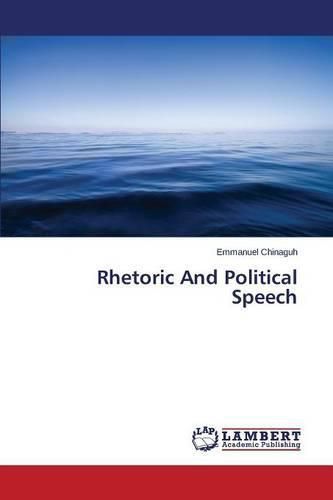Readings Newsletter
Become a Readings Member to make your shopping experience even easier.
Sign in or sign up for free!
You’re not far away from qualifying for FREE standard shipping within Australia
You’ve qualified for FREE standard shipping within Australia
The cart is loading…






This title is printed to order. This book may have been self-published. If so, we cannot guarantee the quality of the content. In the main most books will have gone through the editing process however some may not. We therefore suggest that you be aware of this before ordering this book. If in doubt check either the author or publisher’s details as we are unable to accept any returns unless they are faulty. Please contact us if you have any questions.
This study examines rhetoric in relation to its use in political speech. It reflects Aristotelian stance on rhetoric which is ‘an ability…to see available means of persuasion’ (trans. 1991). The persuasive effects of language as used in political discourse is thus the central concern of this work. Language continues to develop with the dynamics of social life. It is noteworthy how creative Politicians can be in deploying language to ‘sell’ their beliefs, convictions or ideologies. Desperation, no doubt, causes purveyance of falsehood in this process which explains the negative stereotype attached with rhetoric, the task is for the communicative audience to improve their sense of judgment. Rhetorical Structure Theory (RST), developed by William Mann and Sandra Thompson in 1988, was used as the descriptive framework for this study. The data is political speech and Albert Arnold Gore’s 2000 Presidential Concession Speech was utilized for the analysis. RST shows coherence relations in discourse and their schematic representation. Analysis of Al Gore’s speech shows high use of Concession relation which is the subject of the speech, and Background relation to situate his concession.
$9.00 standard shipping within Australia
FREE standard shipping within Australia for orders over $100.00
Express & International shipping calculated at checkout
This title is printed to order. This book may have been self-published. If so, we cannot guarantee the quality of the content. In the main most books will have gone through the editing process however some may not. We therefore suggest that you be aware of this before ordering this book. If in doubt check either the author or publisher’s details as we are unable to accept any returns unless they are faulty. Please contact us if you have any questions.
This study examines rhetoric in relation to its use in political speech. It reflects Aristotelian stance on rhetoric which is ‘an ability…to see available means of persuasion’ (trans. 1991). The persuasive effects of language as used in political discourse is thus the central concern of this work. Language continues to develop with the dynamics of social life. It is noteworthy how creative Politicians can be in deploying language to ‘sell’ their beliefs, convictions or ideologies. Desperation, no doubt, causes purveyance of falsehood in this process which explains the negative stereotype attached with rhetoric, the task is for the communicative audience to improve their sense of judgment. Rhetorical Structure Theory (RST), developed by William Mann and Sandra Thompson in 1988, was used as the descriptive framework for this study. The data is political speech and Albert Arnold Gore’s 2000 Presidential Concession Speech was utilized for the analysis. RST shows coherence relations in discourse and their schematic representation. Analysis of Al Gore’s speech shows high use of Concession relation which is the subject of the speech, and Background relation to situate his concession.